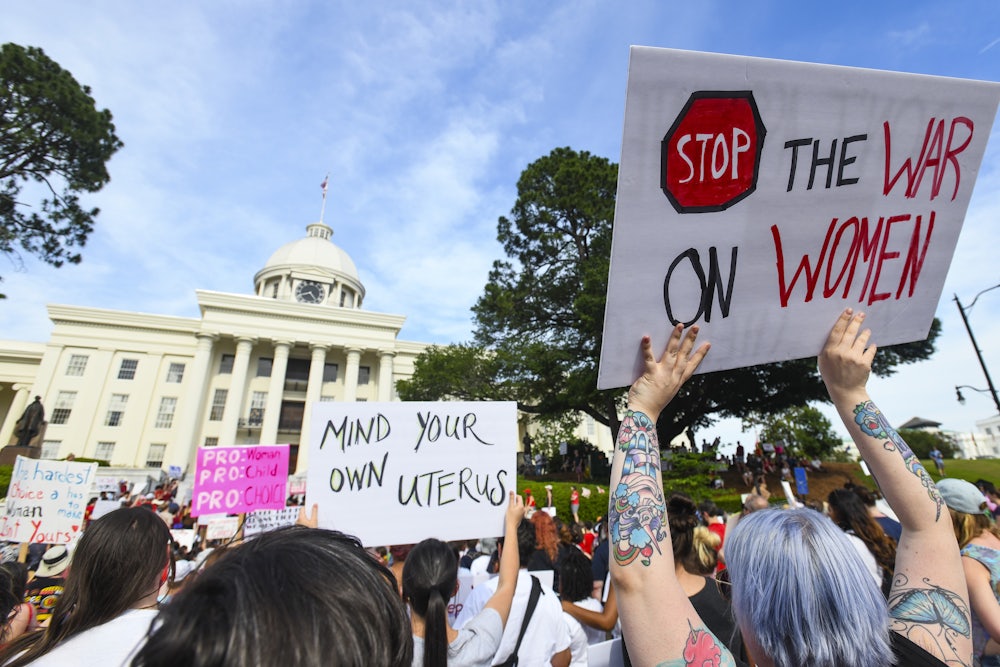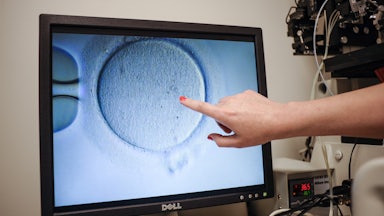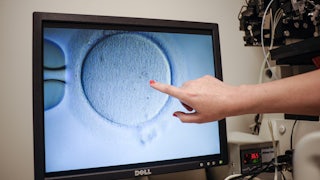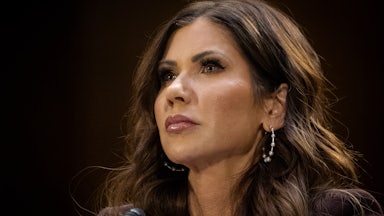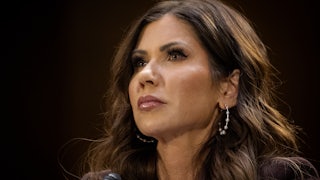The Alabama Supreme Court stunned the nation earlier this week by ruling that frozen embryos are children under state law. The decision has vast implications not only for abortion rights in Alabama, but also for treatments like in vitro fertilization, or IVF, which help couples struggling with infertility to conceive children. Some fertility clinics in Alabama have already paused the service while they analyze the full implications of the ruling.
Monday’s ruling is a watershed moment for the fetal personhood movement, which seeks to recognize any fertilized embryo as a person under the law. As a matter of law, the court’s decision is a fairly straightforward reading of Alabama’s statutes and its state constitution, especially after a 2018 amendment entrenched fetal personhood into the latter.
This is not a case where a court has imposed its own ideological or philosophical preferences on an unsuspecting state, as sometimes happens in this country. To the contrary, the court is essentially requiring Alabamans to reckon with their electorate’s choices. In that sense, it also doubles as a bright neon-red warning sign about the implications of adopting similar fetal personhood amendments in other states.
The plaintiffs in the lawsuit were three Alabama couples who sought IVF treatment. As part of the treatment, they fertilized multiple embryos. Some were implanted and resulted in live births; others were stored by the fertility clinic nearby the hospital where they received treatment. All of this is common for the tens of thousands of people who go through IVF treatment each year. By some estimates, IVF accounts for between one and two percent of all live births in the United States.
What happened next was random and tragic. In 2020, an unidentified patient at the hospital where the embryos were stored somehow obtained access to the freezer and tried to remove them. “The subzero temperatures at which the embryos had been stored freeze-burned the patient’s hand, causing the patient to drop the embryos on the floor, killing them,” the court noted.
The three couples whose embryos were destroyed sued the clinic and the hospital on multiple grounds. One of those grounds was a claim under the state’s Wrongful Death of a Minor Act. As its name suggests, the 1872 law allows parents to sue others for any “wrongful act, omission, or negligence” that leads to the “death of a minor child.” A district court rejected that claim, concluding that the law’s definition of “minor child” did not extend to embryos.
The state supreme court reached the opposite conclusion on appeal. The justices held that language in the Alabama Constitution, as well as some of the court’s previous precedents, compelled it to recognize the embryos as children for the purposes of the law. “When it comes to the Wrongful Death of a Minor Act, that means coming down on the side of including, rather than excluding, children who have not yet been born,” Justice Jay Mitchell wrote for the court.
Monday’s ruling comes from a unique legal backdrop. When the Supreme Court overturned Roe v. Wade two years ago in Dobbs v. Jackson Women’s Health Organization, the justices said they were leaving decisions about regulating or banning abortion to the states. Prior to the ruling, some state supreme courts in Kansas and elsewhere had independently found a state constitutional right to obtain an abortion. Since those rulings did not depend on the federal constitutional right that had existed under Roe, they survived Roe’s demise.
Other states responded to those rulings by enacting measures that would prevent their own state supreme courts from doing the same thing. In West Virginia, for example, voters approved an amendment in 2018 that declared that “nothing in this constitution secures or protects a right to abortion or requires the funding of abortion.” This language does not ban abortion in and of itself, but it does allow lawmakers to pass restrictions on the procedure that are resilient to state judicial review.
Alabama went one step further. Voters in that state also passed an amendment in 2018 that included the same language disclaiming a state constitutional right to abortion. But it also inserted anti-abortion language into the state constitution that could compel state judges to adopt fetal personhood stances in their rulings. According to the amendment’s text, Alabama “acknowledges, declares, and affirms that it is the public policy of this state to recognize and support the sanctity of unborn life and the rights of unborn children, including the right to life.”
This language reflected the view of the fetal personhood movement, which is increasingly influential in anti-abortion circles. Advocates of fetal personhood generally argue that an ovum becomes a person from the moment of fertilization. Under that position, a frozen embryo would have the same rights and legal personality as a child or a fully grown human being. This stance often overlaps with religious and spiritual beliefs about the soul.
At the political level, fetal personhood advocates hoped to use the position to outflank Roe. While anti-abortion advocates long hoped for the 1973 decision to be overturned, the assumption was that its demise would allow some states to outlaw abortion and other states to legalize it. Advocates hoped that recognizing fetal personhood in the Fourteenth Amendment or through other means would essentially lead to a national ban on the procedure.
How exactly would this view manifest itself in the law? In the Roe era, Republican lawmakers periodically proposed a Human Life Amendment to the federal Constitution that would explicitly enshrine fetal personhood in the national charter. A minority of conservative legal scholars also urged the Supreme Court to adopt this position when it overturned Roe, arguing that it reflected the original public understanding of the Fourteenth Amendment and the common law rights of “unborn children.”
In Dobbs, for example, law professors John Finnis and Robert George urged the justices to adopt such a view. “Recognizing unborn personhood would be a natural exercise of courts’ power to bind parties to a case by applying the law to the facts, disregarding unconstitutional laws, directing lower courts, and enjoining unlawful executive actions,” they argued in a friend-of-the-court brief. Justice Samuel Alito’s majority opinion hinted at sympathy with fetal personhood arguments, but ultimately declined to adopt that view (or any other) as a matter of law.
“Our opinion is not based on any view about if and when prenatal life is entitled to any of the rights enjoyed after birth,” Alito wrote for the court. “The dissent, by contrast, would impose on the people a particular theory about when the rights of personhood begin. According to the dissent, the Constitution requires the states to regard a fetus as lacking even the most basic human right—to live—at least until an arbitrary point in a pregnancy has passed. Nothing in the Constitution or in our nation’s legal traditions authorizes the Court to adopt that ‘theory of life.’”
The Alabama Supreme Court sent mixed signals about its thinking on the matter. Some justices, including the author of the majority opinion, suggested that the ruling was narrowly tailored to the Wrongful Death of a Minor Act and would not affect IVF in general. At the same time, their phrasing and word choices suggested that some practices might be in legal jeopardy.
“The parties to these cases have raised many difficult questions, including ones about the ethical status of extrauterine children, the application of the Fourteenth Amendment to the United States Constitution to such children, and the public-policy implications of treating extrauterine children as human beings,” Mitchell wrote for the majority. “But the Court today need not address these questions because, as explained below, the relevant statutory text is clear: the Wrongful Death of a Minor Act applies on its face to all unborn children, without limitation.”
Other justices on the court took a more expansive approach. One of them was Chief Justice Tom Parker, who is a major figure in the fetal personhood movement. ProPublica described him in 2014 as the Alabama judge who “has figured out how to dismantle Roe v. Wade.” Through his rulings and advocacy, he helped elevate the fetal personhood argument within conservative legal circles. In an unusual concurring opinion that was replete with biblical and Christian theological citations, he took a victory lap of sorts.
“A good judge follows the Constitution instead of policy, except when the Constitution itself commands the judge to follow a certain policy,” he wrote. “In these cases, that means upholding the sanctity of unborn life, including unborn life that exists outside the womb.” He added that the Wrongful Death of a Minor Act “recognizes that this is true of unborn human life no less than it is of all other human life—that even before birth, all human beings bear the image of God, and their lives cannot be destroyed without effacing His glory.” He denied that all IVF procedures would be banned but suggested that the state legislature could enact much greater restrictions on the process.
It’s worth noting that Alabama’s constitutional language, while rooted in the fetal personhood movement, is still a national outlier. Voters in other states have rejected similar efforts to recognize embryos as persons in recent years. In North Dakota, for example, voters rejected a fetal personhood measure in 2014 by a nearly two-to-one margin in the polls. Concerns about its effects on birth control measures, IVF procedures, and women who suffer miscarriages led a significant number of otherwise conservative voters to reject it.
Colorado voters also rejected a personhood amendment on three separate occasions: in 2008, 2010, and 2014. The amendment’s proponents in that state focused on the implications it would have on criminal prosecutions; one of the leading public voices for it was a woman who had lost her unborn child when a drunk driver hit her car. After the amendment’s third consecutive defeat, which was driven by similar concerns about its broader implications for reproductive rights, activists abandoned future attempts to pass one in that state.
Monday’s ruling is prompting similar fears about the legality of IVF. Earlier this week, the University of Alabama at Birmingham health system said it had suspended IVF services in the wake of the court’s decision, citing the heightened legal risks. “We are saddened that this will impact our patients’ attempt to have a baby through IVF,” the university said in a statement. “But we must evaluate the potential that our patients and our physicians could be prosecuted criminally or face punitive damages for following the standard of care for IVF treatments.”
This is not an accidental byproduct of the anti-abortion movement. For some opponents, it is the logical conclusion of it. Former South Carolina Governor Nikki Haley, a Republican presidential candidate, expressed support for the decision. “Embryos, to me, are babies,” Haley said in a NBC News interview on Wednesday. “When you talk about an embryo, you are talking about, to me, that’s a life. And so I do see where that’s coming from when they talk about that.” When asked further about the implications for couples undergoing IVF treatment, she blandly dodged the question: “This is one where we need to be incredibly respectful and sensitive about it.”
Most Americans still generally support a right to obtain an abortion. The ongoing electoral defeats for Republicans and anti-abortion initiatives since 2022 are a testament to that—as is the fact that Americans in increasing numbers are coming around to the opinion that state governments shouldn’t be allowed to limit abortion rights in any way. IVF is undoubtedly even more popular. Politico reported this week that polling by former Trump advisor Kellyanne Conway, which was shared with House Republicans in December, showed that nearly 90 percent of Americans support IVF treatment, including supermajorities of evangelical Christians and anti-abortion voters. Beyond that, the tens of millions of Americans who wrestle with infertility would also represent a potent voting bloc.
Did Alabama voters intend to eliminate IVF procedures when passing the 2018 amendment? Perhaps not. In either event, they must now grapple with the potential consequences of their decision. For Americans in the other 49 states, there is also now a potent warning of the long-term consequences of adopting fetal personhood amendments. While Monday may have been a watershed moment for the movement, it may also prove to be its high-water mark.
